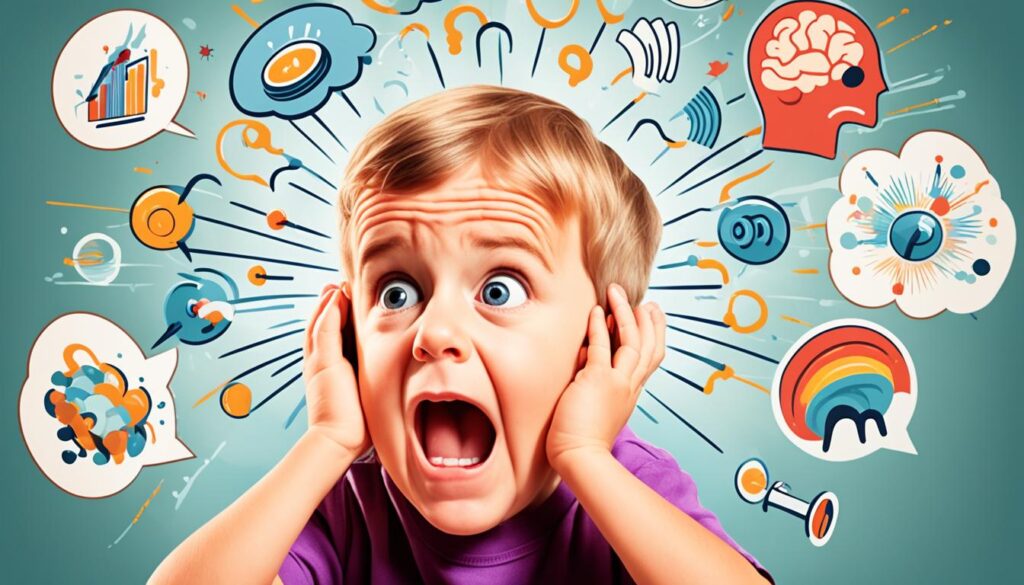Have you ever seen a child suddenly stop talking or act like they don’t understand you anymore? For some families, this isn’t just a phase, it’s a frightening sign of a rare brain condition called Landau Kleffner Syndrome.
Landau Kleffner Syndrome may start quietly but can have a deep impact on a child’s life. It affects how kids understand and use language, often linked with seizures and sleep brain activity. If caught late, it can affect school, friendships, and even the child’s self-esteem.
In this blog, we will explain what Landau Kleffner Syndrome is, how to spot it early, what causes it, and the best ways to treat it. Let’s break it all down simply.
Table of Contents
ToggleWhat is Landau Kleffner Syndrome?
Landau Kleffner syndrome (LKS) is very rare. It affects how children learn language. Kids with LKS suddenly or slowly lose their ability to understand and speak.
It usually starts when they are between 3 and 7 years old. But sometimes it happens in kids as young as 18 months. LKS is part of a group of epilepsy disorders in children. It’s marked by a specific brain wave pattern and different levels of learning loss.
A Brief History and Discovery of LKS
This condition was first described in 1957 by two doctors, William Landau and Frank Kleffner. That’s where the name comes from. Since then, only a small number of children worldwide have been diagnosed with it.
- It is classified as a rare pediatric neurological disorder.
- Onset usually occurs between ages 3 to 7.
- The estimated global prevalence is about 1 in 1,000,000 children.
- In the U.S., fewer than 200,000 people are affected, qualifying it as an orphan disease (NIH data).
Defining Features of the Syndrome
Landau Kleffner Syndrome stands out due to its unique signs:
- Sudden or gradual loss of language skills (both speaking and understanding)
- Abnormal brain activity, especially during sleep
- EEG spikes in brain regions linked to language (left temporal lobe)
One key sign is a condition called auditory verbal agnosia, which means the child hears sounds but can’t understand spoken words. Imagine hearing your mom’s voice but not knowing what she’s saying, that’s how it feels.
Signs and Symptoms
Catching Landau Kleffner Syndrome early can help treatment work better. Here’s what to look out for.
Language Regression
This is the most noticeable sign:
- Child suddenly stops speaking normally
- May ignore you, but it’s not out of defiance, they might not understand you
- May try to speak but get words mixed up or stop trying entirely
Seizures and Sleep Disturbances
Seizures may happen, often during sleep:
- About 80% of cases involve nighttime seizures
- These may be absence seizures (blank stares), myoclonic jerks, or full-body movements
- Most parents don’t notice them right away unless EEG is done
Behavior and Emotional Issues
With communication issues, children can become frustrated:
- Hyperactivity and restlessness
- Irritability and sudden mood changes
- Sadness or depression
This happens because they feel misunderstood or left out.

Causes of Landau Kleffner Syndrome
The reasons behind Landau Kleffner syndrome (LKS) are still not fully clear. But, experts think it’s a mix of genetics and the environment. Several things could lead to this rare disorder in kids.
Possible Genetic Factors (GRIN2A Mutations)
Changes in the GRIN2A gene might cause LKS. This gene helps make a part of the glutamate receptor. This connection shows genes could influence how LKS begins.
Autoimmune or Inflammatory Dysregulation
Some LKS patients get better with immune-suppressing drugs like corticosteroids or IVIG. This finding hints that the immune system or inflammation might be linked to LKS in some kids.
The true causes of LKS are still a mystery. But, scientists are hard at work trying to understand the role of genetics and the immune system. This knowledge is key to finding better, targeted treatments for LKS and helping those living with it.
Diagnosis and Evaluation
Diagnosing Landau Kleffner syndrome (LKS) needs a close look and many tests. The main steps include:
Electroencephalogram (EEG)
EEG is key in spotting LKS. It often shows strong seizure signs, especially during non-REM sleep. These signs are usually clear over the back of the head, near the Sylvian fissure.
Audiometric Examination
A hearing test is done to rule out hearing loss. This is important to tell LKS apart from other conditions that look similar.
Neuropsychiatric Evaluation
Doctors must do a full checkup to understand the syndrome. This includes tests on how the child thinks, acts, and feels. It helps rule out other possible causes for the speech problems.
Speech and Language Assessment
Evaluating the child’s speaking and language skills is critical. It shows where they struggle in understanding and talking. This also helps plan how to help them get better.
Brain Imaging (MRI)
An MRI scan looks for brain issues that could be behind LKS. But it’s common for the scans of those with LKS to be normal.
Using these tests, plus careful questions and watching the child, doctors can make a correct LKS diagnosis. This rules out other reasons for the speech and brain problems.
Landau Kleffner Syndrome Treatment
The standard treatment for Landau Kleffner syndrome is complex. Doctors rely on antiepileptic medications as the first line of defense. These drugs, like valproate, ethosuximide, and benzodiazepines, are crucial for managing the seizures common in this syndrome.
Antiepileptic Medications
For kids with Landau Kleffner syndrome, treatment often involves antiepileptic drugs. Examples include divalproex, ethosuximide, levitiracetam, and benzodiazepines. They work to control the spike-wave EEG patterns and reduce seizures.
Speech and Language Therapy
Helping kids with Landau Kleffner improve their communication skills is key. Speech and language therapy play a big part in this. These sessions aim to restore the child’s ability to understand and use language.
Sign Language Instruction
Some children with Landau Kleffner may benefit from learning sign language. This can be alongside the traditional therapies. Sign language offers an extra way for kids to express themselves.
Immunotherapy (Corticosteroids, IVIG)
Immunotherapy might also be used, with options like corticosteroids or IVIG. This is for cases where autoimmune or inflammatory issues are suspected. It works by adjusting the immune system. The goal is to boost the child’s language and thinking skills.
Long-Term Outlook and Prognosis
The future for a child with Landau Kleffner Syndrome depends on many factors.
Recovery Timeline
- Some children regain language skills slowly
- Others retain childhood aphasia into adulthood
- Progress is often seen after 6 months of therapy
Factors That Influence Outcome
- Younger age at diagnosis improves recovery
- Faster start to therapy shows better results
- Children with mild seizures tend to do better
Every child is different. No one-size-fits-all answer.
Landau Kleffner Syndrome Epidemiology
Landau Kleffner syndrome (LKS) is very rare, affecting about 1 in a million kids. It seems to happen more often in boys than in girls. But, we don’t know why this is the case.
In Japan, a study found LKS occurs in about 1 in a million children. From 1957 to 1980, there were 81 reported cases. But between 1981 and 1991, this number rose to 117. This shows LKS is rare but not unheard of.
There is a pattern in LKS, with boys getting it more than girls. Scientists are still figuring out why this is. They believe more research is needed to understand the Landau Kleffner Syndrome Epidemiology.
Landau Kleffner Syndrome Research
Research on Landau Kleffner syndrome (LKS) is making significant progress. Scientists are looking into both genetic and other causes of this rare childhood condition. They’re focusing on the GRIN2A gene mutations and potential autoimmune links.
Ongoing Studies on Genetics and Pathophysiology
GRIN2A gene mutations, related to the NMDA glutamate receptor, are linked to various epileptic conditions, including LKS. Specialists are studying how these genetic issues might disrupt a child’s language and cognitive growth.
Some LKS kids have shown improvement with treatments that suppress the immune system. This has led to investigation of autoimmune or inflammatory involvement in the syndrome. The goal is to find better treatments based on these findings.
Clinical Trials for New Treatments
Scientists are also exploring new ways to help LKS kids through clinical trials. They’re looking at the benefits of drugs that block calcium channels and a surgery called multiple subpial transection. These aim to help children who don’t get better with the usual therapies.
These trials are trying to bring more treatment choices for those with Landau Kleffner syndrome. It’s about finding better ways to help, aiming to enhance the lives of those dealing with this disorder.

Differential Diagnosis
Landau Kleffner syndrome might look like other childhood disorders. These include autism spectrum disorders, Rett syndrome, or epilepsy. It’s key to look closely at how the disorders show up and do the right tests. This helps tell Landau Kleffner apart from them.
Autism Spectrum Disorders
Autism spectrum disorders (ASD) affect social skills and behaviors. Both ASD and Landau Kleffner can make it hard to talk and understand others. Yet, they have different reasons and signs. Doctors need to carefully check the child’s behavior and skills to know which problem they have.
Rett Syndrome
Rett syndrome is rare and mostly hits girls. It causes kids to lose skills, their hands do unusual movements, and they have seizures. Even though it impacts talking, too, Rett syndrome is different from Landau Kleffner. The changes happen in unique ways, and there are special signs like hand movements to help doctors tell them apart.
Epilepsy
Epilepsy covers many disorders that lead to seizures. Landau Kleffner syndrome is a kind that mainly affects talking and understanding. It’s important to use tests like EEG and study how the child’s language and thinking change. This helps see if it’s Landau Kleffner or another epilepsy type.
Support and Resources
Many resources are available for families and individuals living with Landau Kleffner syndrome.
The Landau-Kleffner Syndrome Foundation is one of these. They offer info, help, and a place for a community to form around this rare condition.
Online support groups are also great for sharing stories and finding support. They are a place for those affected by Landau Kleffner to connect and help each other.
Educational Resources
Educational websites and materials can help families and caregivers understand Landau Kleffner syndrome better. They cover the condition, treatments, and tips for helping children learn and grow.

Conclusion
Landau Kleffner syndrome is a rare and complex childhood disorder. It can significantly impact a child’s language development and their well-being. The exact causes of Landau Kleffner syndrome are not fully known.
Yet, ongoing research and clinical trials seek to understand and treat it better. With early intervention and the right support, many children can improve their language skills. They can also enhance their quality of life.
By raising awareness and giving comprehensive care, we can support these children and their families. This helps them face the challenges of this rare disorder. It also lets them aim for a better future.
FAQ
What is Landau Kleffner syndrome?
Landau Kleffner syndrome (LKS) is a rare disorder that kids can get. It makes them lose the ability to understand and use words. This problem is part of some types of epilepsy that happen in children.
What are the symptoms of Landau Kleffner syndrome?
Kids with LKS often find it hard to understand speech at first. They may seem like they can’t hear or they act like they are autistic. Later, they might not be able to talk themselves and start using other ways to communicate, like by signing. Around 70% of these kids will also have seizures.
What causes Landau Kleffner syndrome?
The exact reasons for LKS are not clear. Experts think it’s because of both things in the genes and things in the environment. Changes in a gene called GRIN2A have been tied to some types of epilepsy, including LKS. Sometimes, medicines that weaken the immune system help some kids. This tells us the immune system might attack the body in a way that causes LKS.
How is Landau Kleffner syndrome diagnosed?
Doctors need to look at a lot of things to tell if a child has LKS. They look at brain wave tests (EEG), how well the child can hear (audiometric tests), and how the brain and behavior work (neuropsychiatric tests). They also check how the child speaks and understands speech, and they do brain scans with MRI. All these tests help make sure it’s LKS and not something else causing the problem.
How is Landau Kleffner syndrome treated?
Treating LKS uses many methods. Doctors use certain medicines to control seizures. Teaching the child how to talk again is also a big part of treatment. For some, learning sign language can be helpful. If the immune system attacking itself seems to be the cause, special medicines might be used to stop this.
What is the prognosis for Landau Kleffner syndrome?
How well a child with LKS does can be different. Some get much better at talking, and others do not. Starting treatment early is very important for the best chance of getting language skills back. Even though the outcomes are not always the same, many kids can improve a lot over time.
How rare is Landau Kleffner syndrome?
LKS is very rare, affecting about 1 in a million children. It seems to be more common in boys than in girls, but we don’t know why that is yet.
What is the current research on Landau Kleffner syndrome?
Scientists are still looking into what causes LKS. They study genes and how the body’s hidden army (immune system) could be involved. There are also tests to find new ways to help kids who don’t get better with the usual treatments.
How is Landau Kleffner syndrome differentiated from other conditions?
Sometimes, LKS might get confused with other problems like autism or epilepsy. Doctors must do careful tests to make sure they know what the child might have.
What support resources are available for Landau Kleffner syndrome?
There are many places to turn for help with LKS. Groups like the Landau-Kleffner Syndrome Foundation give info and connect families. Online groups can also be a good support. It’s important to learn as much as possible to help take care of someone with LKS.
Source Links
- https://rarediseases.org/rare-diseases/landau-kleffner-syndrome/
- https://www.ncbi.nlm.nih.gov/books/NBK547745/
- https://lluch.org/conditions/landau-kleffner-syndrome
- https://www.verywellhealth.com/landau-kleffner-syndrome-lks-4691954
- https://www.ncbi.nlm.nih.gov/pmc/articles/PMC7124882/
- https://www.childneurologyfoundation.org/disorder/landau-kleffner-syndrome/
- https://www.childrens.com/specialties-services/conditions/landau-kleffner-syndrome
- https://pubmed.ncbi.nlm.nih.gov/31613525/
- https://www.sciencedirect.com/topics/psychology/landau-kleffner-syndrome
- https://www.ncbi.nlm.nih.gov/pmc/articles/PMC320814/
- https://www.ncbi.nlm.nih.gov/pmc/articles/PMC7445094/
- https://rarediseases.info.nih.gov/diseases/6855/landau-kleffner-syndrome/living
- https://www.ncbi.nlm.nih.gov/pmc/articles/PMC3162843/
- https://www.sciencedirect.com/science/article/abs/pii/S0165587610004684
- https://aepi.biomedcentral.com/articles/10.1186/s42494-021-00067-9
About The Author

Medically reviewed by Dr. Chandril Chugh, MD, DM (Neurology)
Dr. Chandril Chugh is a U.S.-trained, board-certified neurologist with expertise in diagnosing and managing neurological disorders, including migraines, epilepsy, Parkinson’s disease, and movement disorders. His clinical focus includes evidence-based neurological care and patient education.
All content is reviewed for medical accuracy and aligned with current neurological guidelines.




